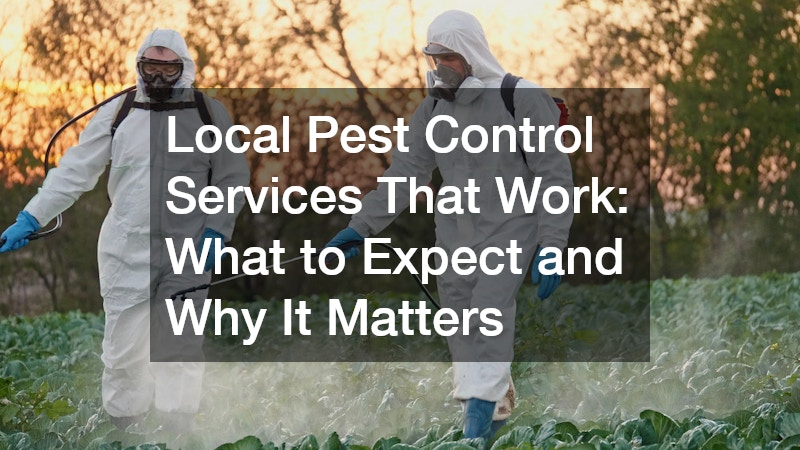Effective pest control services are integral to maintaining a clean and safe living environment. Understanding the workings of local pest control can help property owners make informed decisions to protect their homes from unwanted intrusions. This article aims to provide comprehensive insights into what to expect from local pest control services, articulate their importance, and guide readers in choosing the right service provider.
Initial Inspection and Pest Identification
The initial inspection is a critical step in pest control services where professionals assess the property to determine the type and extent of pest infestation. Technicians employ various techniques and tools, such as moisture meters and infrared cameras, to detect hidden pest activity.
Proper pest identification allows control services to tailor an effective treatment plan that targets the specific pests present in a property.
Identifying pests accurately is essential as different pests require different management strategies. For example, treating for ants might involve locating and addressing their entry points, while mitigating rodent issues could focus on eliminating nesting sites. An accurate assessment ensures that resources are not wasted on ineffective treatments, leading to long-term resolution of pest issues.
Treatment Plans and Methods
Once pests are identified, pest control services develop a customized treatment plan tailored to the specific needs of the property. Treatment plans can range from chemical applications, such as insecticides and rodenticides, to eco-friendly options like heat treatments and biological control. A well-constructed treatment plan balances effectiveness with safety, considering the unique circumstances of the client’s home or business.
The choice of treatment method often depends on factors such as the severity of the infestation, the type of pest, and the client’s preferences. For example, while chemical treatments may offer rapid results, some clients may opt for organic or less invasive methods if they have concerns about safety or environmental impact. Pest control providers work closely with clients to choose the most suitable method for their situation.
Follow-Up and Maintenance
Follow-up visits are an essential component of effective pest control. After the initial treatment, technicians return to assess the success of the treatment and make adjustments if necessary. Regular follow-ups ensure that any residual pest activity is addressed, maintaining the integrity of the treatment plan.
Ongoing maintenance is critical in preventing future infestations. This involves implementing preventative strategies such as sealing entry points, regular sanitation, and monitoring for any signs of pest activity. Consistent maintenance enables property owners to detect and address potential problems before they escalate.
Cost Factors and Pricing Models
Several factors influence the cost of pest control services, including the type and severity of the infestation, the size of the property, and the treatment methods chosen. As a result, pricing models can vary significantly, ranging from single-service treatments to annual service agreements. Understanding these cost factors helps clients make informed budgeting decisions.
While some clients may be deterred by the upfront cost of professional pest control, it is crucial to consider the long-term savings. For example, addressing a termite infestation early can save potentially thousands of dollars in structural repairs. Pest control services offer a valuable investment in safeguarding property health and value.
Comparing different pricing models can help clients choose a service that fits their budget and needs. Some companies offer guarantees or warranties, providing additional assurance that the client will receive value for their investment. Clients should not hesitate to ask for detailed explanations of pricing structures and any hidden fees associated with the service.
Long-Term Benefits
Effective pest control offers several long-term benefits, including maintaining the property value and ensuring the safety of inhabitants. Pests can cause significant structural damage, health risks, and discomfort if left untreated. Professional pest control services eliminate these risks, providing lasting protection and comfort.
By preserving the condition and value of a property, pest control contributes to long-term financial security. For instance, homebuyers are more likely to invest in a property that is free from pest issues, which can positively impact the resale value. Property owners who prioritize pest control demonstrate a commitment to maintaining a safe and healthy living environment.
Comparing DIY and Professional Services
DIY pest control might seem like a cost-effective option, but it often lacks the efficiency and guarantee of professional services. Homeowners may struggle to accurately identify the pests or apply treatments effectively, leading to wasted resources and potential risk. Professional pest control offers trained technicians with specialized knowledge and equipment, ensuring comprehensive management.
While DIY methods can work for minor issues, significant infestations often require professional intervention. Professionals bring expertise in applying advanced treatment methods and staying current with the latest products and technologies. Moreover, professional services include follow-up visits and ongoing support to ensure long-term results.
Evaluating Customer Service and Reviews
Customer service quality is a vital aspect when choosing a pest control service. Responsive, courteous, and knowledgeable representatives can enhance the overall client experience. Assess how promptly the company responds to inquiries and addresses concerns during the evaluation phase.
Local pest control services provide an essential line of defense against pests, protecting properties and ensuring safe living environments. The article highlights the comprehensive nature of pest control services—from initial inspection to ongoing maintenance—and the benefits these services offer. Understanding what to expect from local pest control not only prepares property owners to handle pest-related challenges but also emphasizes the importance of selecting skilled professionals to safeguard their investments.


